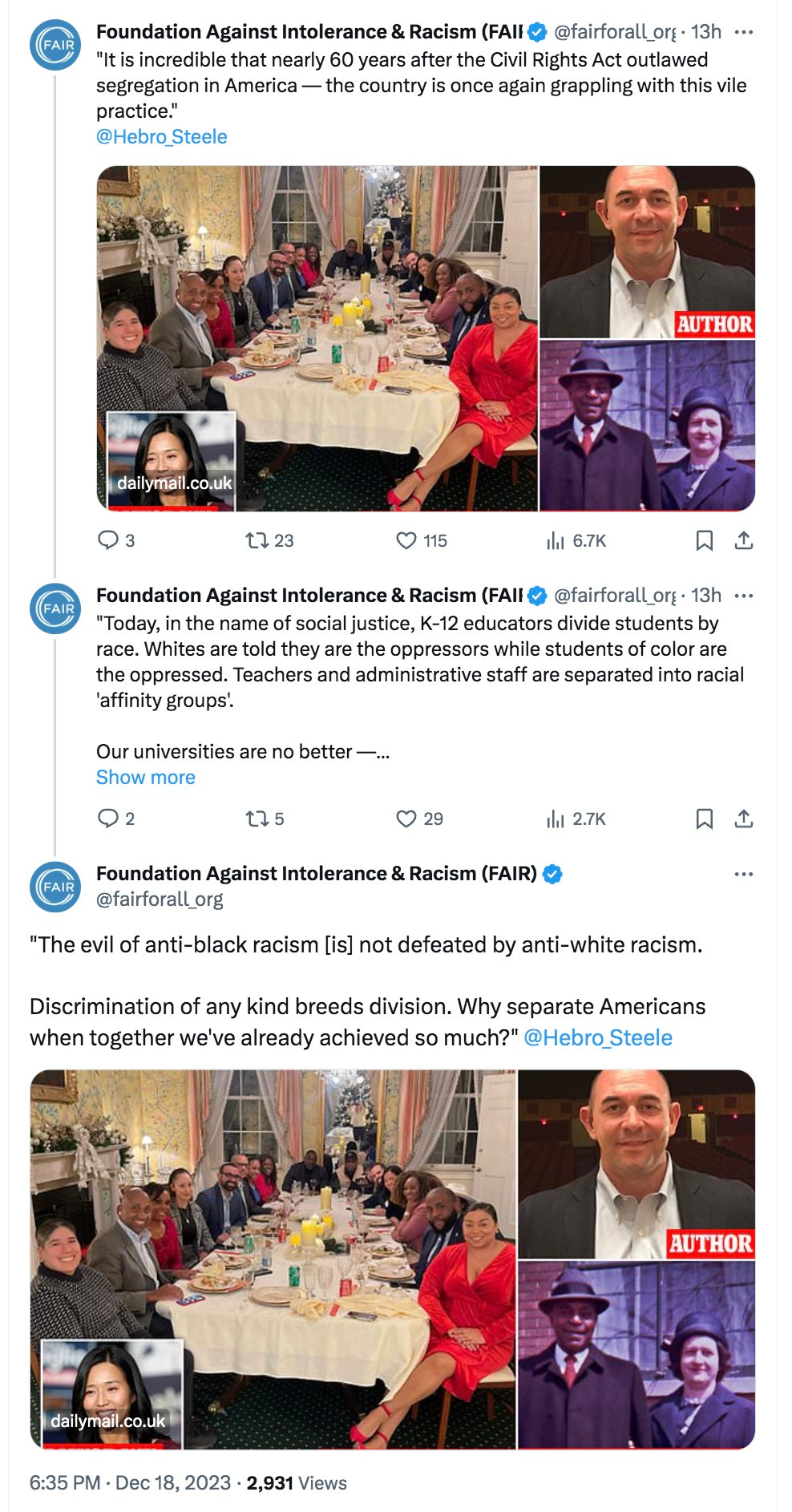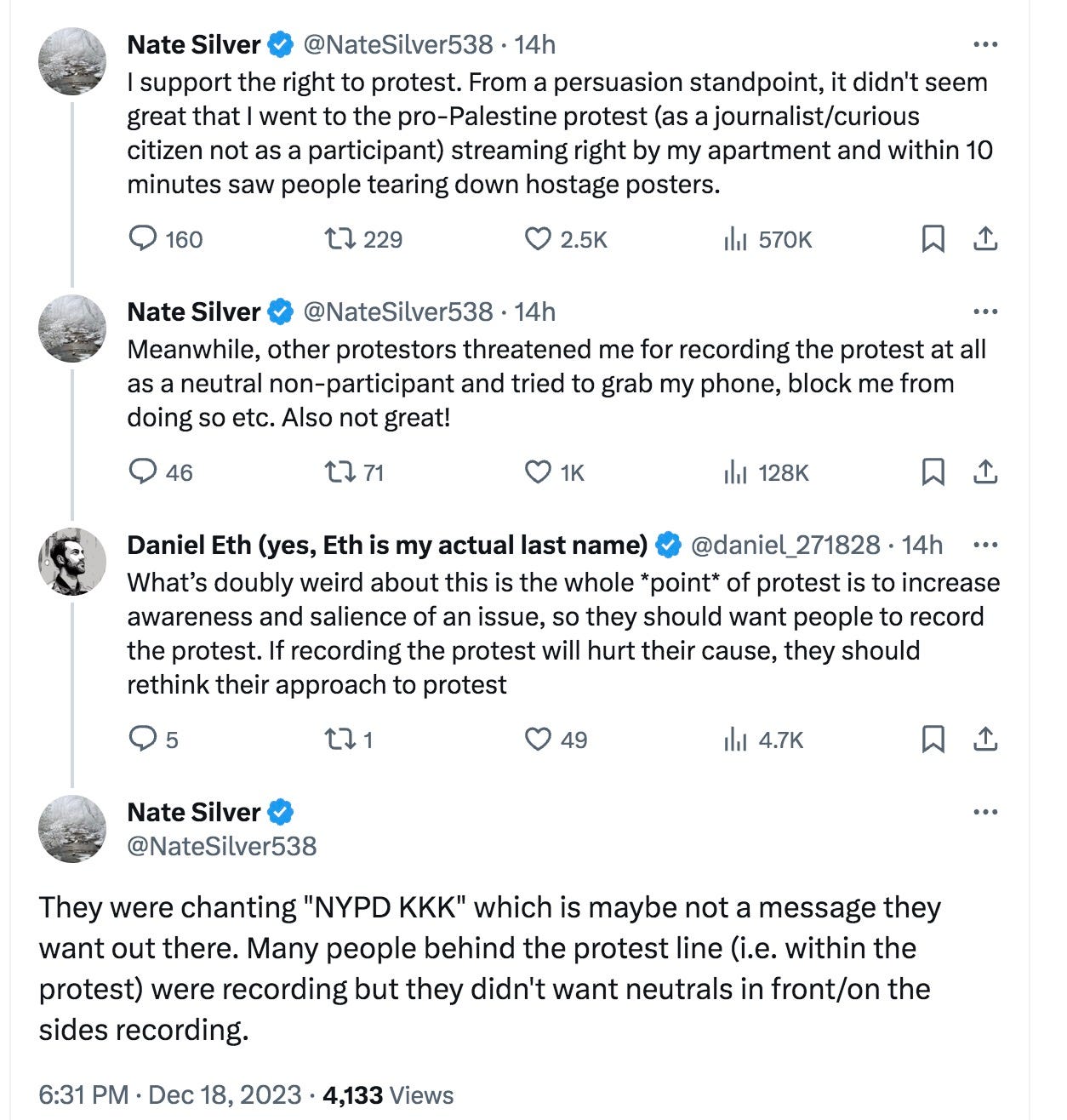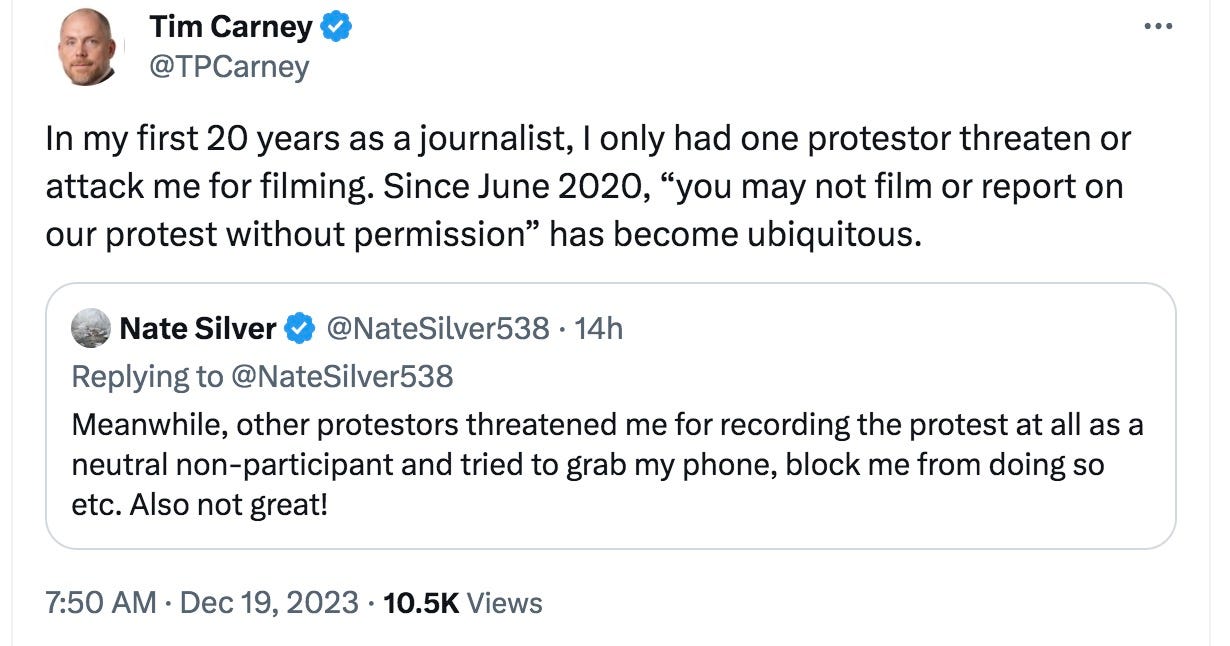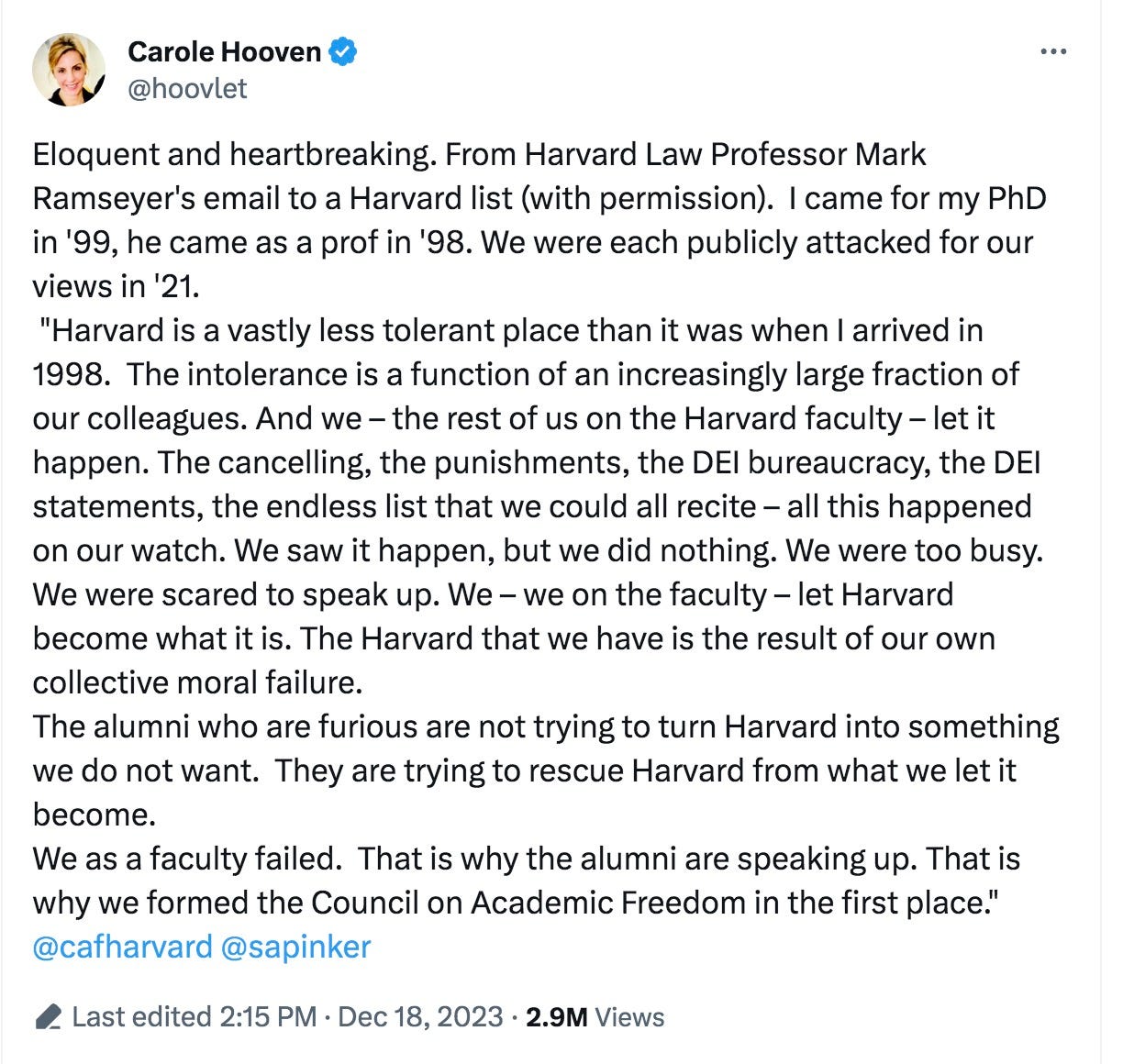E-Pluribus | December 19, 2023
The university donor revolt; a proposal for US leadership without nation building; the bounds of the First Amendment and religious freedom.
A round-up of the latest and best musings on the rise of illiberalism in the public discourse:
Heather Mac Donald: The Academy at the Crossroads
Does America’s system of higher education further the cause of freedom and the values upon which this country was founded, or undermine them? City Journal’s Heather Mac Donald writes that the response to the October Hamas attack on Israel is giving donors pause when it comes to that question. It remains to be seen if their influence can right the ship.
[T]he academy stands at a crossroads. For decades, Wall Street titans funneled billions of dollars into their alma maters, even as those universities promoted ideas inimical to civilizational excellence and economic success. When students started celebrating the October 7 Hamas attacks, however, the mega-donors took note. They did not recognize their campuses, they said, though the pro-Hamas rhetoric came straight from the ethnic- and postcolonial-studies courses that had been a staple of university curricula since the 1980s. Some donors, at Penn and elsewhere, initiated funding boycotts and sought board shake-ups, hoping to pressure their alma maters to correct the anti-Semitism that they deemed responsible for the terror celebrations.
The pro-Hamas protests have exposed the anti-Western ideology that is the sole unifying belief system on college campuses. The question now is whether disgruntled donors and alumni can overcome decades of intellectual misdirection. To do so, they first must define the problem correctly—and avoid the temptation to adopt, for their own purposes, the intersectional Left’s rhetoric about “safety” and “protection” from speech. The proposed new Penn charter is a promising start.
The donor revolt could have broken out at any number of campuses, all of which featured ignorant students cheering on the deliberate massacre of civilians, those students’ faculty enablers and bureaucratic fellow travelers, and feckless presidents. But it first erupted at the University of Pennsylvania and Harvard, perhaps because of the organization and self-confidence of their alumni.
[. . .]
Following the October 7 massacre, [University of Pennsylvania president Liz Magill] made the blunders that would bedevil other college presidents: she did not respond to the attacks with sufficient alacrity to satisfy her critics, and she failed to use the words “I condemn” and “terrorism” when she did respond. By the time she put out a correction on October 15, it was too late; the donor revolt was already spreading. On October 10, Rowan, said to be Penn’s wealthiest alumnus, initiated a second mass movement: a close-the-checkbooks campaign. He urged alumni to send in one dollar to Penn and explain that their ordinary contributions would be suspended until Magill and the chair of Penn’s board, investment bank CEO Scott Bok, resigned. Rowan began emailing a letter to the trustees every day, selecting from among the thousands of such letters from major donors who were closing their checkbooks.
Read it all.
Michael Lind: Why America Need Not Turn Every Country Into A Democracy
It took decades and a civil war to finally extend the promise of America’s democratic ideals to African-Americans and another century before full civil rights protections were achieved. Women’s suffrage took a century and a half to come to fruition. Democracy often takes time, and Michael Lind writes at Persuasion that the US need not make its mission in the world to spread democracy everywhere. There are other ways, Lind argues, the US can exercise its leadership to move things in the right direction.
[There is a] tradition in American foreign policy, dating back to the Founding era. In this view, great-power peace and security, more than form of government, are necessary for the domestic social pluralism that underpins genuine democracy.
In this tradition, making the world safe for American democracy does not require that every country in the world be democratic. It means that the U.S. should use military, diplomatic, and economic means to shape a world order in which external security threats are so low that there is no need to undermine republican liberty at home by defensively creating an American garrison state. The alternative to shop-worn “democratic peace theory,” then, is the theory of democracy-enabling peace. By seeking to bring about great power peace from positions of strength, using confrontation and conciliation as appropriate, the U.S. and its allies can make the world safe for democracy without going to the enormous trouble of trying to make the entire world democratic.
[. . .]
What is left then are two options in a multipolar world: a favorable balance of power and a favorable concert of power.
A favorable balance of power is one in which an aggressive great power is checked by a defensive coalition of other great powers which together enjoy not merely a slight superiority but a considerable “preponderance of power.” Even better than that would be a favorable concert of power, in which every great power, whether democratic and liberal and pluralist or not, agrees to work out differences and bring about legitimate geopolitical change by peaceful means while negotiating arms control.
My proposal is to synthesize these two options into a “concert-balance strategy.” In the heated atmosphere of today’s Cold War II, only the balance part is possible. The immediate priority should be a military buildup coupled with a program of reshoring defense-critical manufacturing for the U.S. and for its European and Asian allies. Such a program would raise the costs of aggression to China and Russia while balancing their power. Meanwhile, in the long term, such a move could enable Washington and its allies to negotiate a modus vivendi with Beijing and Moscow—something close to a concert of power—from a position of strength rather than weakness.
Read it all here.
Andrea Picciotti-Bayer: The Satanic Temple Makes a Mockery of Religious Freedom
Does the First Amendment guarantee the right to undermine religious freedom? At National Review, Andrea Picciotti-Bayer asserts that organizations such as the Satanic Temple are trying to do just that with bad-faith arguments that mock the “free exercise” guaranteed in the Constitution.
A misunderstanding of religious freedom and the authority of the government to regulate the use of its property seems to have led folks in Iowa’s state capitol astray. And that’s understandable, because the secular Satanists are adept at exploiting the gray areas in interpretation of the First Amendment.
Officials at the relevant agency, the Iowa Department of Administrative Services, said the temple had applied for and met all the requirements for a display. It’s not really clear what those requirements are, but it seems that there is some sort of review process prior to approval. According to state representative Jon Dunwell, a Republican and Christian, “the Satanic Temple petitioned for their display in August and were approved with some modification. They wanted to use an actual goat head (I’m assuming a skull) and were prohibited from doing so.” The other “holiday” displays at the capitol include a nativity scene, a banner by the Iowa Atheists and Freethinkers, and one by the Freedom from Religion Foundation.
This “All Are Welcome” approach superficially appears consistent with the religious-freedom principles robustly protected by the Supreme Court in recent years. Lucien Greaves, the publicity-hungry co-founder of the Satanic Temple, has picked up on this. In an interview with CNN, Greaves insisted: “We don’t want to yield some kind of power to the government to begin picking and choosing between religious groups.” Oh, really?
In reality, Greaves and his Satanic Temple have been engaged in legal shenanigans for quite some time. They have demanded monuments to Satan in public spaces where there are also religious displays. Where local schools have allowed bible-study groups to host after-school clubs, they have invented something called an “After School Satan Club.” With the help of — you guessed it — the American Civil Liberties Union, the Temple recently won a lawsuit against a school district in Pennsylvania that denied the use of school grounds for the Satan Club. The district agreed to pay a whopping $200,000 in attorneys’ fees.
Originally founded to advance noble principles embodied in the First Amendment, the ACLU has since become a shill for progressive causes including, inevitably, gender ideology and “reproductive rights.” In this respect it shares an agenda with the Satanic Temple, which also argues for a religious-freedom right to abortion and has even gone so far as to set up a telehealth abortion clinic: the “Samuel Alito’s Mom’s Abortion Clinic,” charmingly named to spite the author of the Court’s decision striking down Roe v. Wade.
In short, these are not organizations of integrity. And it’s my view that this issue has nothing to do with exercising religious freedom and everything to do with trying to undermine it.
Read the whole thing.
Around Twitter (X)
The Foundation Against Intolerance & Racism (FAIR) weighs in on Boston mayor Michelle Wu’s “Electeds of Color Holiday Party”:
Nate Silver on the new phenomenon of protesters who object to being recorded:
And finally, via Carole Hooven, a lament for Harvard:










